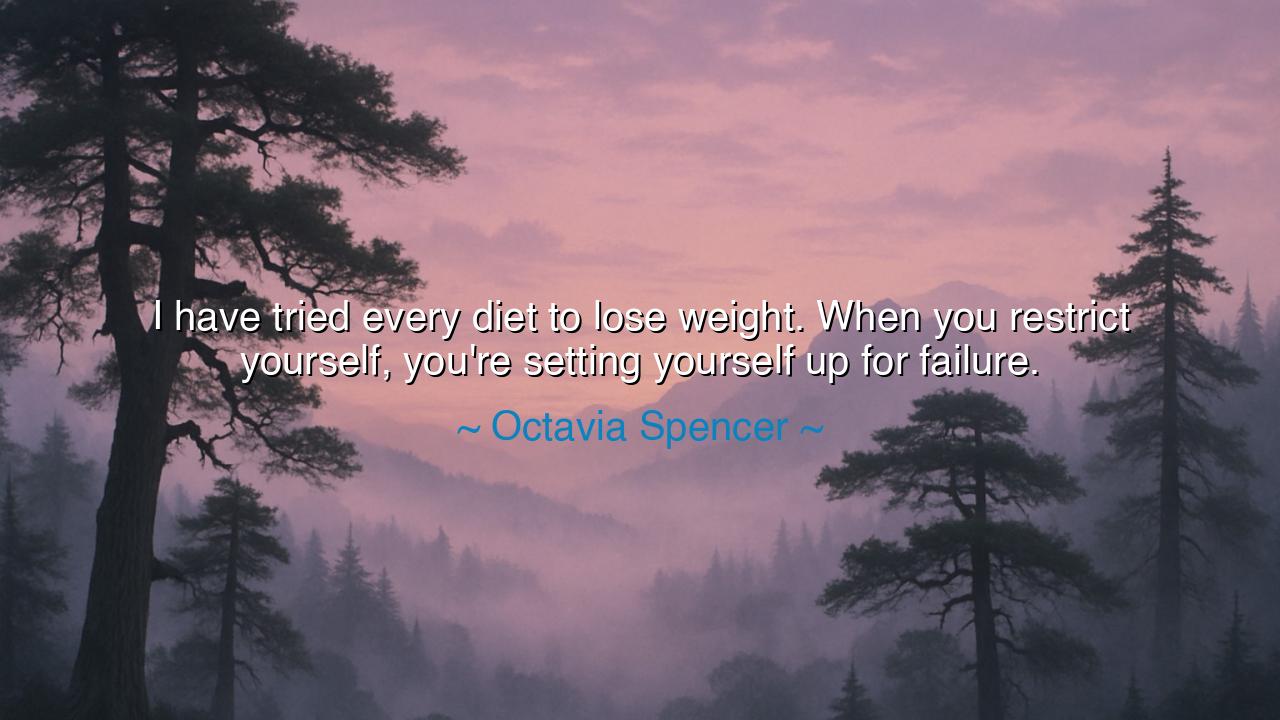
I have tried every diet to lose weight. When you restrict
I have tried every diet to lose weight. When you restrict yourself, you're setting yourself up for failure.






In the grand tapestry of life, where the body and the spirit are intertwined, there lies a profound truth about the dangers of restriction and the importance of balance. The words of Octavia Spencer, "I have tried every diet to lose weight. When you restrict yourself, you're setting yourself up for failure," speak to an ancient wisdom that resonates deeply across time and culture. In these words, Spencer reveals a truth as old as humanity itself: that to live in harmony with the body, we must recognize its needs and desires, not as enemies to be conquered, but as aspects of the self to be understood and honored.
The ancient Greeks, those seekers of wisdom, recognized that the key to a healthy life was not found in extreme measures, but in moderation. Aristotle, in his writings on virtue, spoke of the golden mean—the idea that true happiness and well-being are found not in excess or deprivation, but in finding a middle path. This balance, Aristotle argued, is the way to achieve virtue, for a life of extreme restraint or indulgence is a life out of harmony with nature. Spencer's reflection on the dangers of restriction echoes this ancient wisdom: when we try to deny ourselves the pleasures of life, we set ourselves up not for success, but for struggle and eventual failure. The body, much like the soul, thrives when nurtured, not when bound by excessive limits.
Consider the Stoics, such as Seneca and Epictetus, who sought to master their desires not through denial, but through awareness and control. They understood that the pursuit of moderation was not about harsh deprivation but about knowing what the body truly needs and giving it the proper sustenance, without overindulgence or neglect. Epictetus, in his teachings, reminded us that true freedom comes not from limiting what we desire but from understanding our desires and learning to live in balance with them. Spencer’s words, then, serve as a modern reminder of the same truth—the path to health is not found in the extreme and the restrictive, but in the balanced, the mindful, and the sustainable.
The story of the Buddha, the great spiritual teacher of ancient India, also teaches us the dangers of extremes. In his early years, the Buddha sought enlightenment through extreme asceticism, subjecting himself to rigorous fasting and self-denial. Yet, he soon realized that such restriction only led him further from the truth. The Buddha’s eventual realization—that the path to enlightenment lay not in deprivation but in the Middle Way—was a profound teaching on balance. He understood that the body and the mind must be nourished, not starved, and that true peace comes from meeting the needs of the body without excess. In the same way, Spencer's reflection on dieting serves as a modern echo of the Buddha’s ancient wisdom: that when we restrict ourselves too much, we create a barrier to true well-being.
Spencer's insight also calls us to consider the psychological and emotional toll that extreme diets can have on the soul. The ancient Romans, who were known for their grand feasts and indulgence, also understood the importance of moderation and pleasure in life. Cicero, the great Roman statesman and philosopher, often wrote of the importance of living a life of joy, not in excess, but in balance. He believed that the key to a fulfilled life lay in being able to appreciate the simple pleasures of the body—food, companionship, and rest—without becoming enslaved by them. The idea of excessive restriction that leads to a collapse of willpower was something the ancients were well aware of. They recognized that true happiness is not found in denying ourselves pleasure, but in understanding how to enjoy it in a way that serves both the body and the spirit.
The lesson, then, is profound and vital: to restrict oneself in the pursuit of health is to deny the very essence of what it means to live in balance. The body, mind, and spirit must be nurtured with care and respect, not through extreme deprivation, but through mindful choices that reflect the wisdom of moderation. Spencer's reflection is a call to embrace a more holistic approach to health—one that honors the body's needs and desires without falling prey to the tyranny of extreme diets and unattainable standards.
In our own lives, let us take this ancient wisdom to heart. Let us reject the cycle of dieting that leads to failure and instead cultivate a practice of mindful eating, where we nourish the body with balance and awareness. Let us remember that health is not a destination reached through restriction, but a journey shaped by moderation, self-compassion, and respect for the body's natural rhythms. By embracing this path, we will not only find greater physical vitality but also emotional peace and spiritual well-being. The key to health is not found in extreme measures, but in the gentle art of living in harmony with the body, the mind, and the world around us.






AAdministratorAdministrator
Welcome, honored guests. Please leave a comment, we will respond soon